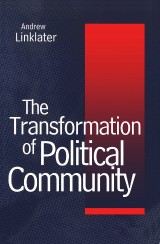Details

Transformation of Political Community
Ethical Foundations of the Post-Westphalian Era1. Aufl.
|
19,99 € |
|
| Verlag: | Wiley |
| Format: | |
| Veröffentl.: | 29.05.2013 |
| ISBN/EAN: | 9780745677644 |
| Sprache: | englisch |
| Anzahl Seiten: | 272 |
DRM-geschütztes eBook, Sie benötigen z.B. Adobe Digital Editions und eine Adobe ID zum Lesen.
Beschreibungen
Sovereign nation states, which were formed in the context of major war, have been deeply exclusionary in their dealings with minority cultures and alien outsiders. In this book, Andrew Linklater claims that globalization, the pacification of core areas of the world economy and ethnic revolt challenge these traditional practices. As a result, new forms of political community and citizenship have become possible. <p>In an original synthesis of recent developments in social and political theory, <i>The Transformation of Political Community</i> argues for new forms of political community which are cosmopolitan, sensitive to cultural differences and committed to reducing material inequalities. The book provides a bold account of post-Westphalian societies and the ethical principles which should inform their external relations. Linklater argues for political communities in which human relations are governed by dialogue and consent rather than power and force.</p> <p><i>The Transformation of Political Community</i> will be of interest to students and academics in international relations, politics and sociology.</p>
Preface and Acknowledgements. <p>1. Anarchy, Community and Critical International Theory.</p> <p>The Critique of Neo-Realism.</p> <p>The Problem of Community in International Relations.</p> <p>The Changing Context of the Modern State.</p> <p>Theorizing the Reconfiguration of Political Community.</p> <p>2. Universality, Difference and the Emancipatory Project.</p> <p>Difference, Self-determination and Exclusion.</p> <p>The State, Citizenship and Humanity. Universalism, Domination and Otherness.</p> <p>3. The Dialogic Ethic and the Transformation of Political Community.</p> <p>Limits on Exclusion: Membership, Citizenship and Global Responsibilities.</p> <p>The Dialogic Community.</p> <p>Dialogue and Discourse.</p> <p>Universalism Revisited.</p> <p>4. The Modes of Exclusion and the Boundaries of Community.</p> <p>The Critical Sociology of Inclusion and Exclusion.</p> <p>Social Learning and International Relations.</p> <p>Inclusion and Exclusion in World Civilisations.</p> <p>Towards a Sociology of Bounded Communities.</p> <p>5. State Power, Modernity and its Potentials.</p> <p>Origins of the Paradoxes of the Modern State.</p> <p>On the Ambiguities of State Power.</p> <p>On the Possibility of New State Structures.</p> <p>The Post-Exclusionary State: Answerability to Universal Rationales.</p> <p>6. Community and Citizenship in the Post-Westphalian Era.</p> <p>Citizenship and its Development.</p> <p>The Problem of the Exclusionary Sovereign State.</p> <p>Beyond the Westphalian State.</p> <p>Citizenship in the Post-Westphalian State.</p> <p>Cosmopolitan Citizenship.</p> <p>Conclusion.</p> <p>Notes.</p> <p>Bibliography.</p> <p>Index.</p>
"This is one of the two or three most important works of international political theory of the 1990s, a book that will be required reading for everyone concerned with the ethical foundations of the emerging post-Westphalian international order. It is not simply the best account yet available of the contribution critical theory can make to International Relations, it is the most impressive work of international theory in general to have been produced in Britain since Bull's <i>Anarchical Society</i> twenty years ago." <i>Chris Brown, University of Southampton</i> <p>"This will be one of the most important books in international theory published in this decade. In it, Linklater follows the logic of his two earlier books to outline his vision of post nation-state communities. This is a magisterial work, revealing a profound understanding of the competing ethical debates within international theory. Linklater has written a magnum opus: it is a powerful examination of patterns of inclusion and exclusion in international politics. He makes a persuasive case for a different form of political community by extending Habermas's notions of discourse ethics into the international realm. This will be required reading for all those interested in international ethics and in international political theory." <i>Steve Smith, University of Wales, Aberystwyth</i></p> <p>"Andrew Linklater has been one of the major voices in contemporary international relations theory ... his latest book is ... his best. By any gauge, this is a book of large ambitions and implications and it is a tribute to the power of the book that it succeeds in making so complex a case splendidly." <i>International Affairs</i></p> <p>"<i>The Transformation of Political Community</i> really is one of the most important books in international theory published in the last decade or so. It offers a major contribution to contemporary international relations theory, and feeds usefully into the literatures on globalization, European integration, and cosmopolitan democracy. At the same moment, it is an outstanding work of political theory ... the range and depth of scholarship deployed in its crafting has resulted in a dense work, but one that is also unfashionably readable." <i>Political Studies</i></p>
Andrew Linklater is Woodrow Wilson Professor of International Politics at the University of Wales, Aberystwyth. His main publications and research interests have been concerned with the changing nature of political community, the significance of critical theory for international relations and the problem of harm in world politics.
Sovereign nation states, which were formed in the context of major war, have been deeply exclusionary in their dealings with minority cultures and alien outsiders. In this book, Andrew Linklater claims that globalization, the pacification of core areas of the world economy and ethnic revolt challenge these traditional practices. As a result, new forms of political community and citizenship have become possible. <p>In an original synthesis of recent developments in social and political theory, <i>The Transformation of Political Community</i> argues for new forms of political community which are cosmopolitan, sensitive to cultural differences and committed to reducing material inequalities. The book provides a bold account of post-Westphalian societies and the ethical principles which should inform their external relations. Linklater argues for political communities in which human relations are governed by dialogue and consent rather than power and force.</p> <p><i>The Transformation of Political Community</i> will be of interest to students and academics in international relations, politics and sociology.</p>


















